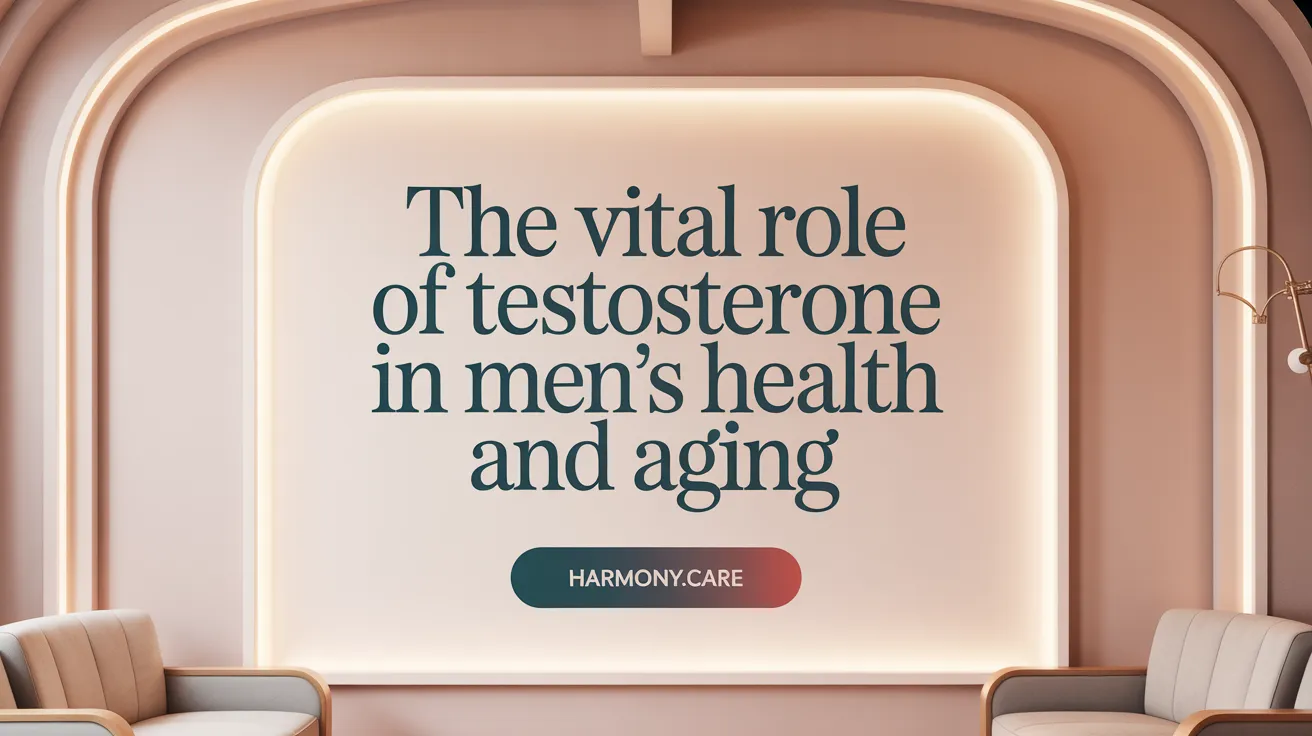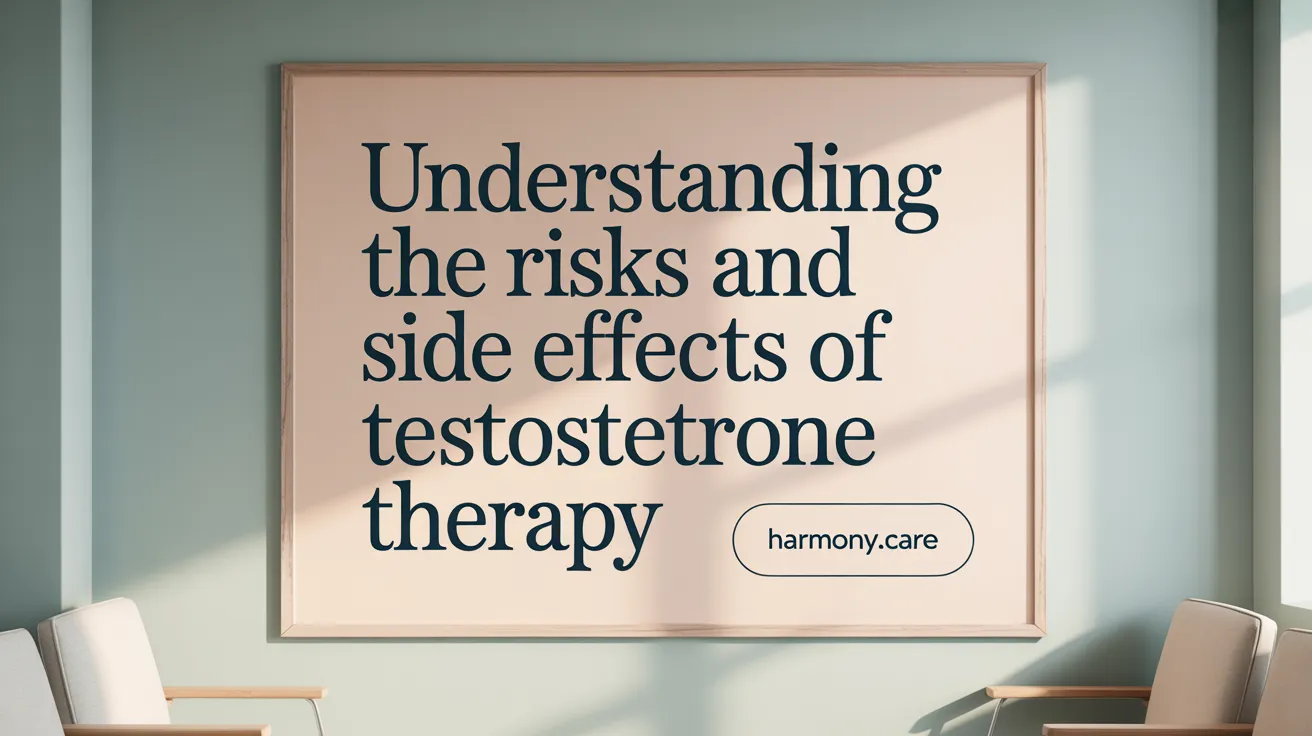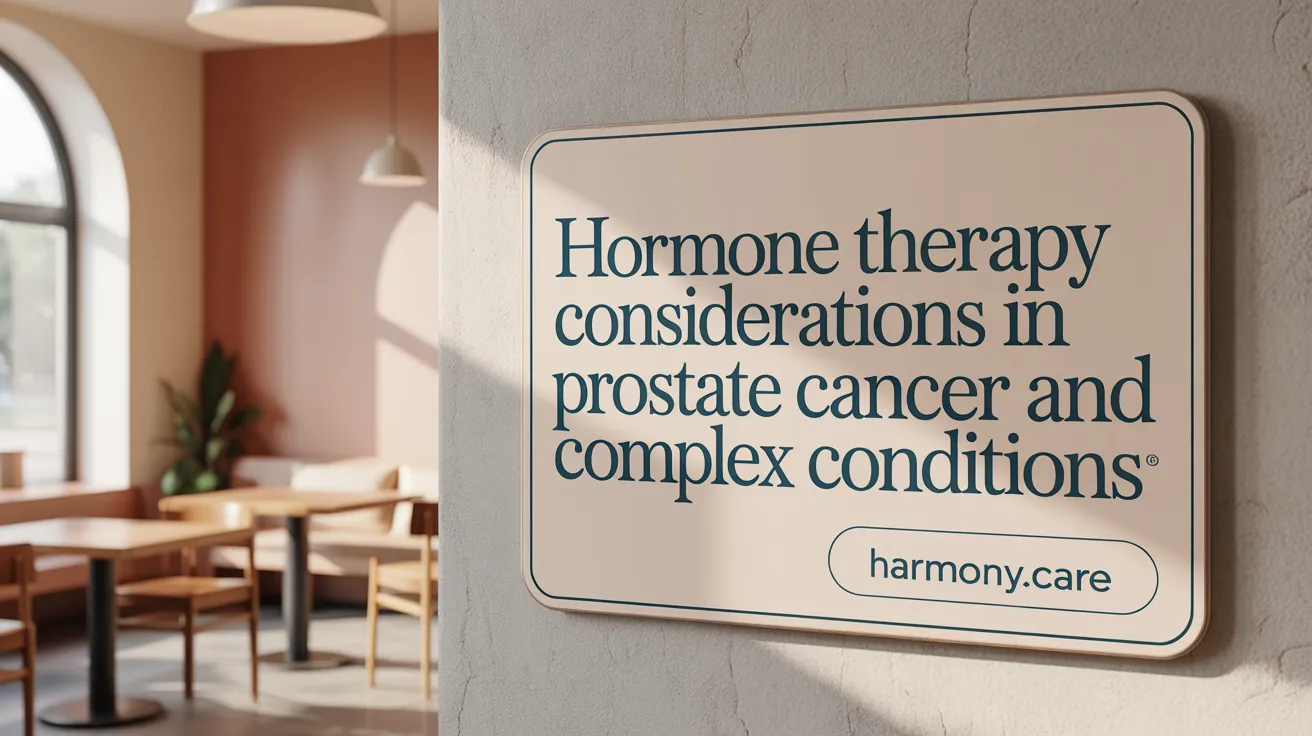Understanding Hormone Therapy for Men's Wellness
Hormone therapy for men, particularly testosterone replacement therapy (TRT), has gained increasing attention as a viable option for addressing symptoms caused by hormonal decline and imbalances. This article explores the landscape of hormone therapy options, benefits, risks, and emerging practices to support men in achieving optimal wellness through personalized hormone care.
The Role of Testosterone in Male Health and Aging

What is testosterone and what roles does it play in men's health?
Testosterone is the primary male sex hormone mainly produced in the testicles. It is essential for the development and maintenance of male physical traits such as muscle mass, bone density, facial and body hair, and sexual function. Beyond these roles, testosterone supports red blood cell production and influences mood, motivation, and cognitive functions. For detailed information on Testosterone hormone functions and Testosterone and men's health, visit these resources.
How does testosterone naturally change with age?
Testosterone levels peak during adolescence and early adulthood but begin to decline gradually at about 1% per year starting around age 30 or 40. This decline is a normal part of aging and does not always produce symptoms. However, in some men, testosterone levels may decrease enough to cause noticeable physical and emotional changes. See Age-related decline in testosterone levels and Testosterone Decline and Aging for more.
What are common symptoms indicating low testosterone levels?
Men experiencing low testosterone may notice several symptoms, including reduced sexual desire, erectile dysfunction, increased body fat, and decreased muscle mass and strength. Other signs include reduced bone density, fatigue, mood changes such as depression or low motivation, and difficulties with concentration. Learn more about Symptoms of low testosterone and Signs of hormonal imbalance in men.
How do clinicians distinguish normal age-related testosterone decline from hypogonadism?
To differentiate between natural aging and hypogonadism—a medical condition where testosterone production falls below normal—physicians conduct blood tests, ideally done in the early morning, measuring total and free testosterone levels multiple times. The diagnosis combines lab results with clinical symptom assessments. Additional hormone tests and imaging may be necessary to investigate underlying causes in cases of hypogonadism. For comprehensive details on Diagnosing low testosterone and Hypogonadism and testosterone, see these authoritative resources.
Hormone Replacement Therapy (HRT) and Testosterone Replacement Therapy (TRT) Options

Overview of hormone therapy for men
Hormone therapy for men, particularly addressing low testosterone, primarily involves testosterone replacement therapy (TRT). TRT is designed to restore hormonal balance that may be disrupted due to aging, medical conditions such as hypogonadism, or lifestyle factors. Its goal is to improve symptoms like decreased libido, fatigue, muscle loss, and mood changes.
Forms of testosterone therapy
There are multiple delivery methods for testosterone therapy to accommodate patient needs and preferences. These include:
- Intramuscular injections: provide periodic testosterone doses.
- Transdermal patches: applied to the skin for steady absorption.
- Topical gels and creams: spread on the skin daily.
- Subcutaneous pellet implants: small pellets placed under the skin offering consistent hormone release for months.
- Buccal tablets and nasal gels: mucosal absorption methods.
- Oral pills: less commonly used due to liver metabolism concerns.
Use of bioidentical hormones
Bioidentical hormone replacement therapy (BHRT) uses hormones that are molecularly identical to those naturally produced by the body, typically derived from plant sources like soy or cactus. BHRT is favored for potentially fewer side effects and better absorption compared to synthetic hormones. Clinics offering BHRT often customize formulations based on individual hormone profiles for optimized results.
Personalized treatment approaches
Personalized treatment plans are developed through a thorough evaluation process including medical history, symptom assessment, lifestyle factors, and detailed laboratory testing of hormone levels. Healthcare providers tailor the type of hormone therapy, dosage, and administration method to align with individual health goals and preferences. Ongoing monitoring through blood tests and clinical evaluations ensures adjustments for safety and maximal benefit.
| Therapy Aspect | Description | Notes |
|---|---|---|
| Forms of TRT | Injections, gels, patches, pellets, buccal, nasal, oral | Choice depends on convenience, absorption |
| Bioidentical Hormones | Molecularly identical to natural hormones | Derived from plants; fewer side effects |
| Personalization | Based on medical history, labs, lifestyle, symptoms | Ongoing tailored adjustments |
| Monitoring | Regular blood tests and clinical checkups | Essential for safety and efficacy |
Benefits of Hormone Therapy for Men's Wellness
What are the main benefits of hormone therapy for men?
Hormone therapy for men primarily aims to restore testosterone levels, leading to several notable improvements across physical, mental, sexual, and long-term health domains.
Improvements in physical health
Men undergoing hormone therapy often experience increased muscle mass and strength, which supports better physical performance and can counteract age-related muscle loss. Bone density typically improves, reducing the risk of fractures and osteoporosis. Additionally, therapy can help reduce excess body fat, contributing to a healthier body composition.
Mood and cognitive benefits
Beyond physical gains, hormone therapy is known to enhance mood stability and reduce symptoms like depression and irritability. Cognitive functions such as focus and motivation can also improve, helping men maintain mental clarity and productivity. Many report increased energy levels and better quality of sleep, which further supports overall well-being.
Sexual health enhancement
One of the core benefits is the improvement in sexual desire and performance. Hormone therapy can alleviate symptoms of low libido and erectile dysfunction, restoring sexual vitality and intimacy confidence for men experiencing hormone-related sexual health issues.
Long-term health outcomes
Some studies suggest hormone therapy, when carefully managed, may bring cardiovascular and metabolic benefits. Enhanced bone and muscle health, along with improved mood and energy, can lead to a better quality of life and potentially lower risks of chronic conditions associated with low testosterone.
In summary, hormone therapy offers men comprehensive benefits that include sexual function restoration, physical revitalization, mental wellness, and potential long-term health protections, making it a valuable treatment for those with hormonal imbalances.
Risks and Side Effects Associated with Testosterone Therapy

What are common side effects of testosterone replacement therapy?
Testosterone replacement therapy (TRT) commonly leads to several side effects. Men may experience acne, fluid retention causing swelling, and breast enlargement known as gynecomastia. Mood fluctuations and skin irritation, particularly from topical gels or patches, are also reported. Some patients face a worsening of sleep apnea. TRT may increase red blood cell production, a condition called polycythemia, which can lead to clotting issues. Additionally, TRT often decreases sperm production and can cause testicular shrinkage due to suppression of natural testosterone production.
What are the concerns related to cardiovascular and prostate health?
Earlier worries about TRT increasing prostate cancer risk have been largely challenged by recent research, which finds no direct link between TRT and new prostate cancer development. However, TRT can slightly enlarge the prostate and elevate prostate-specific antigen (PSA) levels, necessitating ongoing monitoring. Cardiovascular risk profiles with TRT are mixed; some studies suggest neutral or even beneficial effects in well-selected individuals, while others caution about potential risks. Polycythemia also raises cardiovascular concerns due to its impact on blood thickness and clot formation.
How does testosterone therapy affect fertility?
TRT suppresses the body's own hormone production, including sperm generation. This suppression leads to reduced sperm count and fertility, making TRT unsuitable for men who wish to conceive. Those considering fathering children should discuss fertility preservation options before initiating therapy.
Why is medical supervision critical during testosterone therapy?
Medical oversight is crucial to safely manage TRT. Regular blood tests monitor hormone levels, red blood cell counts, and prostate health through PSA testing. Cardiovascular status evaluation helps address potential risks early. Supervision allows healthcare providers to adjust treatment doses, prevent or manage side effects efficiently, and ensure that therapy remains aligned with the patient's overall health and wellness goals.
Diagnostic and Monitoring Protocols in Hormone Therapy
What diagnostic steps are necessary before starting hormone therapy?
Before initiating hormone therapy services, a thorough evaluation is essential. This includes taking a detailed medical history and performing a physical examination. Blood tests are critical, measuring total and free testosterone, luteinizing hormone (LH), follicle-stimulating hormone (FSH), prolactin, prostate-specific antigen (PSA), hemoglobin, hematocrit, liver function, and metabolic panels. Testing is ideally performed in the early morning to capture peak testosterone levels. To ensure accuracy, testosterone measurements should be confirmed with multiple tests as recommended in Blood tests for testosterone.
How is therapy monitored over time?
Ongoing monitoring is vital to track treatment effectiveness and safety. Regular blood tests assess testosterone levels, red blood cell counts, liver function, and PSA to detect changes or side effects, consistent with Monitoring testosterone therapy. Clinical symptoms and potential adverse effects are also evaluated during follow-up visits. Monitoring frequency typically ranges from every three to six months, allowing healthcare providers to adjust dosages and address any complications promptly as outlined in Laboratory monitoring during TRT.
Who should oversee hormone therapy?
Hormone therapy should be managed by healthcare professionals experienced in men’s hormonal health, such as board-certified urologist Dr. Marc Gittelman or endocrinologists and specialized hormone clinics. These providers develop personalized hormone treatment plans based on individual profiles, ensuring proper diagnosis, addressing contraindications, managing comorbid conditions, and providing comprehensive men's health care throughout therapy.
Natural and Lifestyle Approaches to Supporting Hormonal Health

What lifestyle factors support healthy hormone levels?
Maintaining hormonal health naturally involves several key lifestyle habits. Regular strength training and cardiovascular exercises boost testosterone levels and improve hormone receptor sensitivity. Quality sleep is critical, as it regulates hormones like testosterone and cortisol. Stress management techniques such as meditation or yoga reduce cortisol, a stress hormone that can disrupt overall hormonal balance.
A nutritious, balanced diet plays a fundamental role. Consuming healthy fats, sufficient protein, and essential vitamins and minerals supports hormone production. Specifically, vitamins D and B complex, minerals like zinc and magnesium, and omega-3 fatty acids contribute positively to hormone regulation.
Are there natural supplements to aid testosterone levels?
Certain supplements may help support natural testosterone production. These include vitamin D3, zinc, magnesium, fenugreek, ashwagandha, D-Aspartic acid, and Tribulus Terrestris. While some evidence supports their efficacy, results can vary, and they should only be used under the supervision of a healthcare professional to ensure safety and appropriateness.
When should men consider lifestyle changes versus hormone therapy?
For men experiencing mild symptoms or borderline low testosterone levels, lifestyle modifications are an advisable first step. This approach can improve hormone levels and overall wellness without the risks associated with hormone therapy. Hormone replacement therapy is generally reserved for men with clinically confirmed low testosterone accompanied by significant symptoms. In many cases, lifestyle changes and hormone therapy can be combined as part of a comprehensive treatment plan for optimizing hormonal health.
Comprehensive Men's Health and Hormone Optimization Programs
What additional services support hormone therapy in men's health?
Clinics specializing in men's hormone therapy often offer a wide range of complementary services to promote optimal health. These include thorough wellness assessments that evaluate physical, emotional, and lifestyle factors. Nutrition counseling and personalized lifestyle coaching focusing on diet, exercise, and stress management are key components.
Additional offerings frequently encompass weight management programs, peptide therapies, targeting muscle and energy, sexual medicine solutions addressing issues like erectile dysfunction, and DEXA scans for health to monitor skeletal health. These combined approaches address underlying contributors to hormonal imbalance and support sustained vitality.
How are hormone therapies integrated with other treatments?
Hormone therapy is not a stand-alone treatment; it is integrated within a broader health strategy. Personalized plans incorporate lifestyle interventions, nutritional supplementation, and specific therapies such as peptides to maximize benefits.
This multidisciplinary approach aims to improve energy levels, enhance muscle mass, support sexual function, and optimize metabolic health. By aligning hormone therapy services with comprehensive wellness efforts, patients receive care tailored to their unique health profiles and goals, supporting long-term hormone optimization strategies and overall well-being.
Special Considerations: Hormone Therapy in Prostate Cancer and Other Conditions

How is hormone therapy used in prostate cancer management?
Hormone therapy plays a critical role in managing prostate cancer by lowering androgen levels, mainly testosterone, or blocking their activity to slow tumor growth. This is known as androgen deprivation therapy (ADT). Key approaches include orchiectomy (surgical removal of testicles), LHRH agonists like Leuprolide which initially cause a testosterone surge then suppress production, LHRH antagonists such as Degarelix that quickly reduce testosterone without a surge, antiandrogens that block androgen receptors, and androgen synthesis inhibitors like Abiraterone which prevent hormone synthesis in adrenal, testicular, and cancer cells. In advanced or metastatic prostate cancer, ADT is generally a lifelong treatment to control disease progression and symptoms.
What side effects occur with hormone therapy in prostate cancer?
ADT often results in significant side effects due to lowered testosterone levels. Patients commonly experience sexual dysfunction, erectile problems, reduced libido, and shrinkage of sexual organs. There is loss of muscle and bone mass leading to increased risk of osteoporosis, alongside increased fat deposits. Hot flashes and mood changes such as depression or irritability are frequent. Metabolic changes may increase risks of diabetes and cardiovascular diseases. Bone health must be closely monitored, and treatments like bisphosphonates or denosumab may be prescribed to prevent bone loss. For more information on side effects and their management, see Managing hormone therapy side effects and Hormone therapy side effects.
Who should avoid testosterone therapy?
Testosterone replacement therapy (TRT) is contraindicated in men with untreated prostate or breast cancer, due to the risk of stimulating cancer growth. It should also be avoided in men with recent cardiovascular events such as heart attack or stroke, uncontrolled severe obstructive sleep apnea, polycythemia or elevated hematocrit, and certain heart failure or liver conditions. Careful patient assessment including comprehensive health history and laboratory testing is essential before initiating TRT to avoid serious complications. For detailed contraindications and patient evaluation, refer to Testosterone replacement therapy risks and contraindications.
Regular monitoring and collaboration with healthcare professionals are crucial to safely manage hormone therapies, especially in men with complex medical conditions like prostate cancer or significant cardiovascular risk. Access resources on hormone therapy safety and monitoring guidelines to support treatment decisions.
Personalized Hormone Therapy: A Pathway to Men's Vitality
Men's hormone therapy, particularly testosterone replacement, offers promising benefits in enhancing vitality, physical function, mood, and overall quality of life when carefully prescribed and monitored. Understanding the balance of benefits and risks, engaging in comprehensive diagnostic evaluation, and integrating lifestyle modifications are essential to optimize therapy outcomes. Personalized, medically supervised hormone care within a broader wellness framework ensures the safest and most effective path toward sustaining men's health and well-being.
